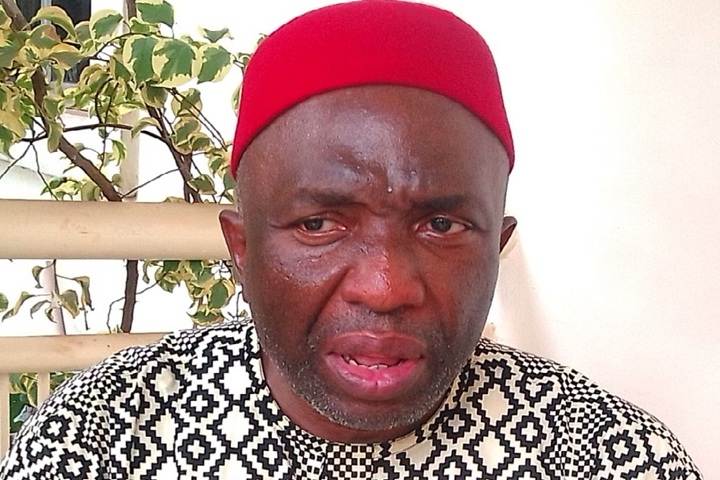The Nigerian Civil War, also known as the Biafran War, lasted from July 6, 1967, to January 15, 1970.
It was one of Africa’s most tragic conflicts, claiming over a million lives and reshaping Nigeria’s political landscape.
Diaspora Digital Media (DDM) gathered that in a recent interview reported by Vanguard News on July 19, 2025, Professor Alphonsus B. C. Nwosu opened up about his role in the war.
Professor Nwosu, a former Minister of Health and current statesman, spoke emotionally about abandoning university studies to enlist in the Biafran Army.
He revealed that he still lives with the physical consequences of the war, having only one and a half lungs due to an injury he sustained.
As a young man during the war, Nwosu said he and many others, including university students, were eager to enlist.
He debunked the notion that Biafrans were conscripted by force, insisting that volunteers begged to join.
According to him, the war could have been prevented if Nigeria had honoured the Aburi Accord reached in Ghana.
He believes that the betrayal of that agreement was the real trigger of the war.
Nwosu recalled that General Odumegwu Ojukwu, then the Eastern Region’s military governor, faced mounting pressure after the federal government allegedly backtracked on the agreement.
He added that if Ojukwu hadn’t declared Biafra’s secession when he did, he might have been killed.
The civil war was not just Ojukwu’s war, Nwosu insisted, it was a people’s war.
He revealed that Ojukwu had instructed him and others to ensure a full record of the events leading to the war was preserved.
A book chronicling those events is already written, with Professor Nwosu as the lead author.
The team began the project under Ojukwu’s directive and includes notable Nigerians like Clement Ebri and Professor Silvanus Kuki.
The book is expected to be released within the next two years and will contain never-before-seen documents.
According to Nwosu, the war wasn’t caused by a single coup, but by a series of events—political betrayals, massacres, and failed agreements.
He mentioned the January 1966 coup, the May 29 pogrom, the Aburi Accord, and meetings with political leaders like Chief Obafemi Awolowo as critical turning points.
He further stated that the narrative around the January coup had been misunderstood.
Nwosu said that contrary to public opinion, the coup was not an Igbo coup or solely led by Major Chukwuma Nzeogwu.
According to him, the mastermind was Major Emmanuel Ifeajuna, who later brought in Nzeogwu.
He said many of the young officers involved were classmates, including Chris Anuforo and Timothy Onwuatuegwu.
They also recruited Major Nwobosi to lead operations in the West.
Their intention, he noted, was not to kill anyone, but circumstances escalated the situation.
Nwosu revealed that the coup was postponed and eventually betrayed.
He also claimed that there was no major crisis in the East or North before the coup, but the West was in disarray due to political greed.
Governance failures, ethnic rivalry, and the hunger for resource control led to rigged elections and census disputes.
He cited books like Why We Struck by Adegboyega and The Five Majors by Ben Gbulie to support his account.
Professor Nwosu strongly believes the war would have been avoided if the Aburi Accord had been upheld.
He recalled that before the war, university students like himself marched with the slogan “On Aburi we stand.”
But when federal troops fired the first shots at Gakem, things changed forever.
He stated that when the war began, it had mass support among Easterners.
“I joined the Biafran Army. I was an officer. If anyone says it was Ojukwu’s war, that is nonsense,” he said.
Nwosu described the war as a fight for survival after Nigerian troops launched what was dubbed “Operation Do or Die.”
He recounted an encounter with a federal brigade believed to be under General Shehu Musa Yar’Adua.
The battalion he led, named the Fearless Infantry Battalion, was ambushed and struck by mortar fire.
Most of his fellow officers died, but Nwosu survived with life-threatening injuries.
He was later flown abroad for treatment and still bears the scars of war.
His men protected him fiercely during the battle, proof that he had treated them well.
He praised their loyalty and bravery during the darkest hours.
Throughout the war, he said, there were close calls and high casualties on both sides.
He noted that not all great officers were Igbo.
One of the most outstanding, he said, was Colonel Afahang Nsudo from Akwa Ibom.
The Biafrans were not pushovers and had organised themselves into Biafra 1 and Biafra 2 for regional defence.
Nwosu lamented that Nigeria has not learned from its past and has failed to fulfil its divine role in Africa.
During President Obasanjo’s administration, he served as political adviser and helped draft a proposal titled African Renaissance.
The paper envisioned Nigeria leading Africa and restoring global dignity to Black people.
But today, Nwosu said, Rwanda has become the model nation Africa looks to, while Nigeria stumbles.
In global universities, Nigerians still lead in excellence, yet their homeland underperforms.
He praised leaders like Babangida and Obasanjo for tapping into Nigeria’s intellectual base.
He particularly saluted Babangida for stating in his book that the 1966 coup was not an Igbo plot.
He believes such honesty is rare and deserves commendation.
Professor Nwosu concluded that the forthcoming book is a moral responsibility to tell the truth.
It aims to educate the next generation and prevent the rewriting of history.
“Ojukwu told us this book must be written,” he said.
“And if we couldn’t, it must be handed over to a capable team.”
That mission, he confirmed, is almost complete.
The book will cover the full story: coups, betrayals, diplomacy, battles, and the burden of memory.
For Nwosu and others who lived through the war, remembering is not a choice, it’s a duty.
👇👇👇
Follow DDM’s official WhatsApp Channel for real-time updates.
https://whatsapp.com/channel/0029Vajkwdc4dTnFHl19vW3g







